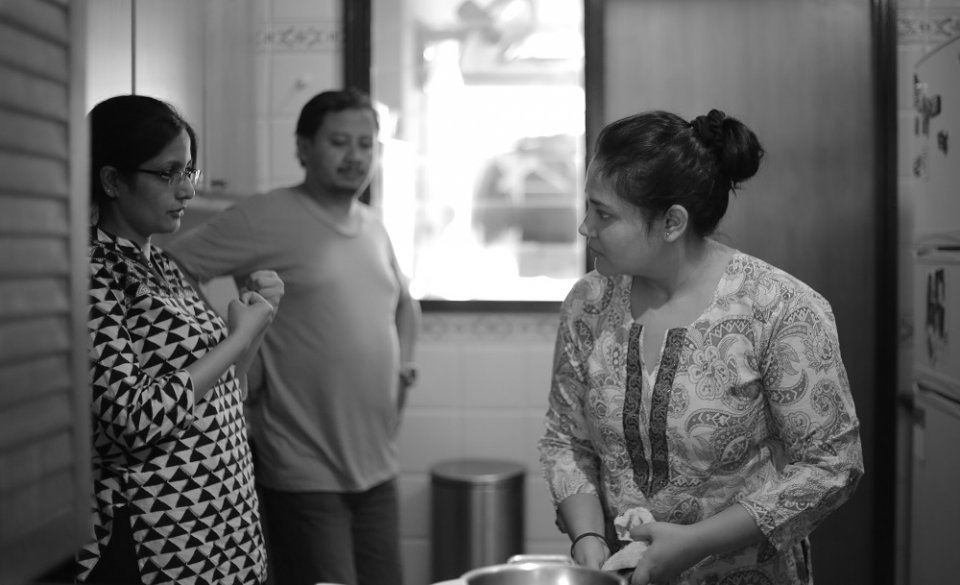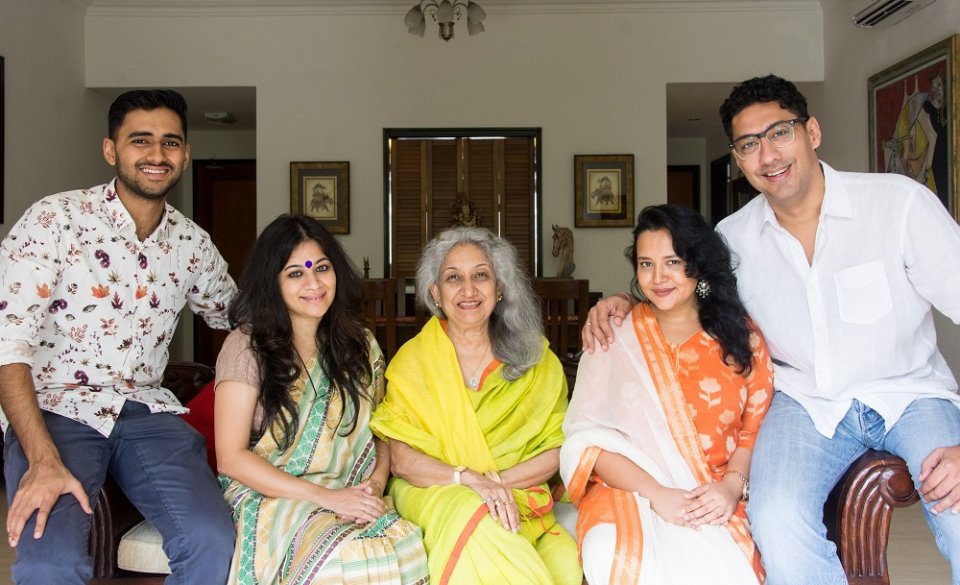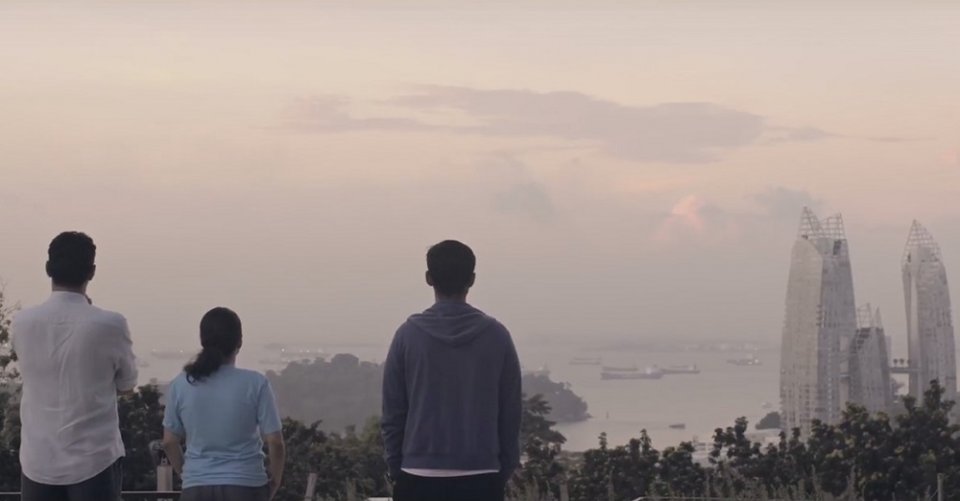Not many filmmakers would be comfortable casting amateurs with zero experience in their films; Shilpa Krishnan Shukla, on the other hand, prefers it. In fact, the 36-year-old Singaporean filmmaker admitted she likes to choose her actors first, and then write custom scripts for them. For her first two short films, Shukla cast a close uncle and her husband respectively.
“It’s a different set of challenges with each of them—but I prefer that, I don’t actually look forward to working with professionals somehow,” she said.
“I think one (reason) is from a production standpoint; film is just a fun thing for me to do, so the people I work with become very important. It’s a family thing—I become really close to my cast, so I can’t go up there and say okay you do this and that.”

Shukla on the set of Tashi
Born in Kerala, India, Shukla came to Singapore in 1998 on a scholarship to study at Raffles Junior College. Later, as an undergraduate at National University of Singapore, she became active in theatre, staging her own productions and reading blogs about film on the side. It was only when a blog she was following made an open call for 1-minute films that Shukla decided to try her hand at the art form.
Both the shorts went on to be shortlisted in the top 25 of the online film festival organised by now-defunct indie film website Passion for Cinema, back in 2008. It proved enough encouragement for Shukla to start experimenting with filmmaking more seriously.
Today, the computer engineer by training has 10 films under her belt, and a bevy of international awards to go with. But her fondness for casting friends and first-timers remains as strong as ever. Her latest film and third full-length feature Tashi, a family drama delving into themes of caregiving and filial piety, cast a 72-year-old lady (Ila Maheshwari) Shukla was close to prior, who had once expressed interest in acting in a film. The English-Hindi Tashi is her feature film debut.
Shot entirely in Singapore in just eight days, Tashi revolves around a family of four (an elderly mother, her two children, and the house helper) and a house guest who has to grapple with caregiving responsibilities. Currently doing its festival circuit, the film has travelled to 12 film festivals across India and won 11 awards. It recently had its Singapore debut in the form of two sold-out screenings at The Projector last Sunday (Nov 25).

The cast of Tashi
Ultimately, Shukla’s approach to film has a homemade, from-the-heart quality that’s missing in many hotshot commercial films today. Aside from casting friends, Shukla works with a small team of regulars who, like herself, never received formal training at a film school. Her budget hovers typically around $20,000 a film, shooting schedules wrap in under 10 days, and all the necessary post-production work (from editing to dialogue dubbing) is done in her house.
“(The process has) always been very independent—extremely low budget,” she said, equating her production costs to a forfeited family vacation to Europe. “The budget that I have is basically what I save up.”
Even when she made her second feature film Pularum Iniyum Naalekal (There’s Always Tomorrow), shot in Abu Dhabi, Shukla and her team completed filming in 10 days, and racked up an expenditure of $25,000. At last count, the film has travelled to 37 film festivals worldwide, picking up 18 awards across multiple categories.
Her approach is equal parts habit and necessity. A mother of one and full-time marketing director at pharmaceutical company Abbott Healthcare, Shukla juggles filmmaking as a part-time passion. She flies her co-producer and cinematographer Mathew Jenif Joseph down from India for 10 days at a time; so time management is crucial.

Tashi
Her next project, Kathaah@8, is an eight-film anthology of eight regional Indian languages, due to begin filming in February 2019. Multiple challenges await: once again, Joseph will be down for 10 days to shoot, but this time he has to do eight short films within the same period—which works out to roughly one film a day. It’s also the first time Shukla will be working with complete strangers.
“They have to know the language,” she explained. “I really didn’t know that many people from all these communities who could speak the language fluently, so I had to do a call-out—I asked for who is out there, who can speak these languages; and then when they came for auditions I thought okay this girl and this guy can speak the language, maybe I can do a husband-wife thing. I sort of worked around that.”
But these are hardly obstacles for the filmmaker of 10 years. Sharing about the “backbreaking” process of writing, doing outdoor shoots, editing, and dubbing, Shukla is keen to emphasise that it’s still the act of making a movie that brings her joy. So bombard her with numbers all you want—be it in shoot days, distribution stats, or profits. The modern-day Wonder Woman remains unruffled; she’s just having fun.
More on Shukla’s filmmaking ethos below.
How did the idea for Tashi come about? Did you select your cast first?
So it just so happened that I went to watch a play, and all the actors in the play I already sort of knew. I was just in that space, and suddenly I thought wait I can actually write something with these people. So I sort of fixed the cast in my head, and then I wrote the script.
A lot of the inspiration for Tashi, in terms of the theme itself, came because I worked for a brand called Ensure (an adult nutrition drink), and it’s mainly for people who are 50+ years old. I meet with a lot of consumers who are 50+ to listen to them talk, and I get to meet their caregivers. And it was in fact after meeting a particular lady in Singapore that Tashi actually formed as an idea.
This Singaporean lady was a single lady living with her parents, both of whom are sick. It was very difficult talking to her because she herself is close to 50, and she has parents who are 70 to 80 years old; and this whole burden of having to take care of them. She has siblings but they’re married and have their own lives, so the burden of it is coming solely on her. I don’t even know her name; I was talking to her for research. But it was really inspiring.
Are your other films also based on personal experiences you’ve had?
I would say it’s less fiction, more facts, in a lot of my films—mainly because I cannot write about things I don’t have experience with. Because I don’t have time for research, a lot of the concepts are inspired from my life, my extended friends, family.
In contrast, a lot of Singaporean films that do well overseas seem to have very big ideas.
That’s not my style; I can’t make films like that. Maybe I can if I try to think about it that way, but for me the priority is really just to have fun. Film festivals they’re great, but it’s not about that. People like to ask me what I’m going to do with this film (Tashi), what’s next; is it going on Netflix? I don’t know; I honestly don’t even care. Because the money that I put into it is as expensive as a European vacation, let’s say. It is a lot of money—but I just don’t have to go on a vacation for a year and then I can sort of save that; but it’s not a lot of money from a filmmaking perspective.
So to me it’s less about do I get distribution, do I make my money back, do I strike a profit, do I get the awards, do I go to film festivals. I don’t make films with that in mind, and because of that they might not get to that level—and that’s fine.
Do you always shoot in Singapore?
Yes, my only film that was not shot in Singapore is the Abu Dhabi one; every other film is shot here. For Tashi it was mainly things happening inside the house—we used one of the actors’ houses; the rest we did outdoors. We used Faber Point, and a couple of scenes at MacRitchie (Reservoir).
You do a lot of effective budgeting. Is maintaining that hard?
It’s the only way to keep it going right? Which is also why it doesn’t affect me as much. I just tell these people if your satisfaction comes in selling it, or getting that particular festival or this particular award, then you’re going to be very dissatisfied. I get a lot of joy just making a movie; I just really enjoy the process.
Keep up with Shilpa’s filmmaking projects here.





